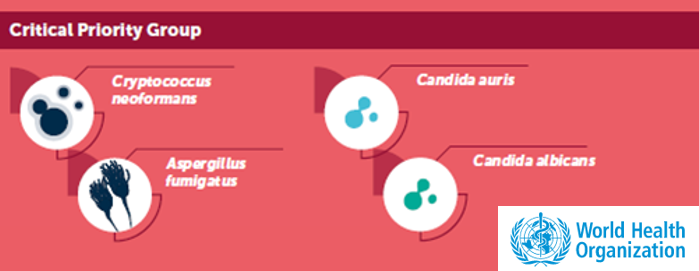How will the WHO’s fungal pathogen priority list help us fight the worldwide fungal threat?
We are very pleased to see that Aspergillus fumigatus was included in the top tier of the WHO’s fungal pathogen priority list, which names the fungi most likely to present a risk to humans and animals in the coming years. Much of the work we do at MRCM revolves around identifying, quantifyng and detecting azole resistance in samples from patients with chronic forms of aspergillosis such as CPA and ABPA.
The incidence of serious human fungal infections is rising worldwide and is likely to continue in ways that are difficult to predict. Global warming is encouraging the appearance of new pathogenic fungal species like Candida auris and the geographical expansion of existing species such as Coccidioides (Valley Fever). During the COVID-19 pandemic, pressure on mycology labs greatly increased because serious viral respiratory infections put patients at risk of fungal superinfections such as invasive aspergillosis and mucormycosis (the ‘black fungus’ seen among many diabetic COVID-19 patients in India).
Given these new risks, action is needed on a worldwide scale to ensure that we will be able to quickly and accurately identify and treat new host/pathogen challenges, and decide which of the existing host/pathogens need more attention. Given finite resource for conducting and implementing research, which fungal species do we need to work on first?
The list was compiled by questioning a large panel of medical mycology experts on what each thought were the highest priority species in their part of the world. There were three categories: Critical Priority, High Priority and Medium Priority. The priorities were ranked with respect to three criteria: 1. Strengthening lab capacity and surveillance, 2. Investments needed in research, development and innovation, 3. Public health.

It is clear that there are a wide variety of fungal species that need specific attention. Most UK hospital laboratories lack the expertise and facilities to perform specialist fungal culture and molecular diagnostics such as Aspergillus PCR. The Mycology Reference Centre Manchester and reference laboratories in Leeds, Bristol and Cardiff are well prepared to identify, diagnose and help treat all serious fungal infection that we are aware of now and develop new diagnostics for fungal challenges arising in the future.
Unfortunately many parts of the world including Asia and Africa are severely lacking in diagnostic infrastructure for fungal infections. The European Confederation for Medical Mycology is helping by setting up centres of excellence (including MRCM) throughout Europe and in the US, but there are few similar resources elsewhere.
In the light of this WHO report, it is vital that more investment is made by governments throughout the globe.

